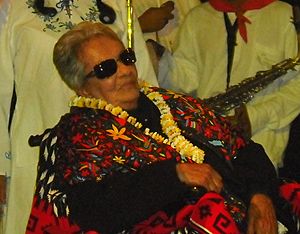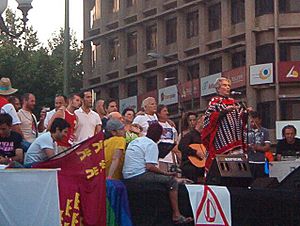Chavela Vargas facts for kids
Quick facts for kids
Chavela Vargas
|
|
|---|---|

Chavela Vargas in 2009
|
|
| Born |
Isabel Vargas Lizano
17 April 1919 San Joaquín de Flores, Heredia Province, Costa Rica
|
| Died | 5 August 2012 (aged 93) Cuernavaca, Morelos, Mexico
|
| Occupation |
|
| Years active | 1961– 2012 |
| Musical career | |
| Genres | |
| Instruments |
|
| Labels | RCA Mexicana |
| Associated acts | José Alfredo Jiménez |
Isabel “Chavela” Vargas Lizano (born April 17, 1919 – died August 5, 2012) was a famous singer from Costa Rica and Mexico. She was best known for singing Mexican ranchera songs. Chavela was a very important singer in both the Americas and Europe. Many artists, like director Pedro Almodóvar, admired her. She was known for her powerful performances. She received a special award called the Latin Grammy Lifetime Achievement Award for her long and successful career.
Contents
Early Life and Music Journey
Chavela Vargas was born in San Joaquín de Flores, Costa Rica. Her birth name was Isabel Vargas Lizano. She had a difficult childhood. Her parents divorced, and she was raised by an uncle. She also had poliomyelitis, a disease that can affect the body. She was called Chavela, which is a loving nickname for Isabel.
When she was 17, Chavela moved to Mexico. She wanted to become a singer, and Mexico had many more chances for musicians. She lived there for over seventy years and became a Mexican citizen. For many years, she sang on the streets. Later, in her thirties, she became a professional singer. She was famous for wearing a special red poncho called a jorongo during her shows. Chavela had a very unique style and always dressed and acted in a way that felt true to herself.
Chavela sang ranchera songs in her own special way. These songs were usually sung by men with a mariachi band. But Chavela sang them by herself, using only her voice and a guitar. She often sang slowly to make the songs feel more dramatic and emotional.
By the late 1950s, she became well-known in the art world. She sang in famous places like Acapulco. Her first album, Noche de Bohemia (Bohemian Night), came out in 1961. She got help from José Alfredo Jiménez, a very famous ranchera songwriter. Chavela recorded more than 80 albums! She was very successful in the 1950s, 1960s, and early 1970s. She toured in Mexico, the United States, France, and Spain. She was friends with many important artists and thinkers of her time, including Juan Rulfo, Frida Kahlo, and Diego Rivera. Chavela's songs often spoke to women, sharing messages of love and strong feelings.
Returning to the Stage
Chavela Vargas took a break from singing for a while. But she returned to performing in 1991 at a nightclub in Mexico City. Her career started to become famous again around the world. She performed in Latin America, Europe, and the United States. In 2003, when she was 83 years old, Chavela sang at Carnegie Hall in New York City. This was thanks to the Spanish film director Pedro Almodóvar, who was a big fan and friend.
Film Appearances
Chavela Vargas appeared in many of Pedro Almodóvar's films. For example, she sang in La flor de mi secreto. She also appeared in the movie Frida, singing the famous song "La Llorona". Another one of her classic songs, "Paloma Negra" ("Black Dove"), was also in the Frida movie. She sang "Tú me acostumbraste" ("I got used to you") in the film Babel, directed by Alejandro González Iñárritu.
In 2017, a movie about her life called Chavela was released. It was directed by Catherine Gund and Daresha Kyi. The film included interviews with people like Pedro Almodóvar.
Death and Legacy
Chavela Vargas passed away on August 5, 2012, in Cuernavaca, Mexico. She had been in the hospital for some time due to breathing problems. According to her official Facebook page, her last words were, "I leave with Mexico in my heart."
On August 6, 2012, Chavela's funeral was held in Plaza Garibaldi in Mexico City. The film Chavela showed parts of her funeral. Many fans and loved ones gathered to honor her. They played her music and drank tequila, which was her favorite drink. Chavela's ashes were scattered in the Chalchi Hills in Morelos, Mexico.
The film Chavela also shared that after she became popular in Spain, she felt more comfortable talking about her identity. She said there was no longer a need to be afraid of being open about who you are. In the film, she said, "My song is for all the women of the world: Mothers, daughters, sisters, wives, friends, and lovers."
Chavela often told her fans, "Human beings love, and that’s all that matters. Don’t ask them who they love or why." She believed in being true to yourself. She said that the person she was before moving to Mexico was "Isabella," someone she cared for. But "Chavela" was born in 1942 when she moved to Mexico. She found a way to be strong and keep living through challenges. In one of her last interviews, she said, "When you’re true to yourself, you win in the end."
On April 17, 2013, Google celebrated her 94th birthday with a special Google Doodle on their homepage. In August 2019, Chavela Vargas was honored on the Rainbow Honor Walk in San Francisco. This walk celebrates people who have made important contributions to society.
Selected Albums
- Con el cuarteto Lara Foster, 1961
- Hacia la vida, 1966
- Corridos de la revolución, 1970
- Amanecí en tus brazos, 1973
- La Original, 1973
- Lamento Borincano, 1973
- Poema 20, 1975
- Noche Bohemia, 1989
- Noche de Ronda, 1989
- Piensa en mí AKA Vuelve, 1991
- Boleros, 1991
- La Llorona, 1994
- Sentimiento de México (vol. 1), 1995
- De México y del Mundo, 1995
- Le canta a México, 1995
- Volver, volver, 1996
- Dos, 1996
- Grandes mementos, 1996
- Macorina, 1994/1996
- Chavela Vargas, 1997
- Pasión bolero, 1999
- Colección de oro, 1999
- Con la rondalla del amor de Saltillo, 2000
- Para perder la cabeza, 2000
- Las 15 grandes de Chavela Vargas, 2000
- Grandes éxitos, 2002
- Para toda la vida, 2002
- Discografía básica, 2002
- Antología, 2004
- Somos, 2004
- En Carnegie Hall, 2004
- La Llorona, 2004
- Cupaima, 2006/2007
- Soledad, 2007
- Piensa en mí, on Splendor in the Grass by Pink Martini, 2009
- Luz de Luna, on San Patricio by The Chieftains featuring Ry Cooder, 2010
- Por mi culpa!, 2010
- Luna Grande, 2012
See Also
 In Spanish: Chavela Vargas para niños
In Spanish: Chavela Vargas para niños
- Ranchera
- Cuco Sanchez
- List of people from Morelos, Mexico
 | Precious Adams |
 | Lauren Anderson |
 | Janet Collins |


